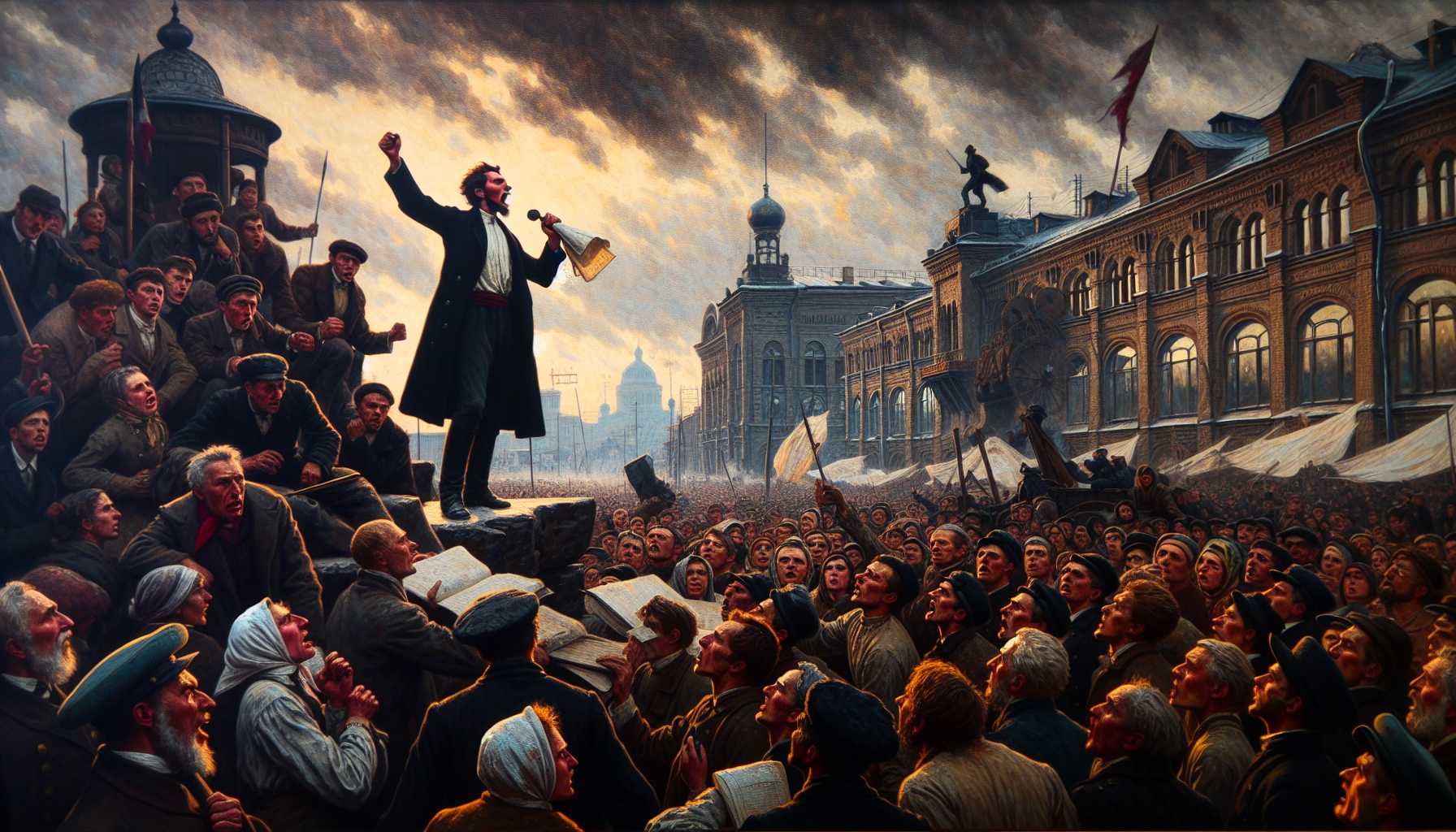
Vladimir Lenin Impact on 20th Century History and Communism
Vladimir Lenin was a pivotal figure in 20th-century history, best known for being the leader of the Bolshevik Party and the architect of the Soviet Union.
Fúlājīmǐěr·Lièníng shì 20 shìjì lìshǐ shàng de yīgè guānjiàn rénwù, zuì zhùmíng de shì zuòwéi Bù'ěrshìwēikè dǎng de lǐngdǎo rén hé Sūlián de dìzàozhě.
弗拉基米尔·列宁是20世纪历史上的一个关键人物,最著名的是作为布尔什维克党的领导人和苏联的缔造者。
Born in 1870 in Russia, he became involved in revolutionary politics in the early 1900s, advocating for Marxist principles and the overthrow of the Tsarist autocracy.
Tā yú 1870 nián chūshēng zài Éluósī, 1900 niándài chūqī cānyù gémìng zhèngzhì, chàngdǎo Mǎkè sī zhǔyì yuánzé bìng tuīfān shāhuáng zhuānzhì.
他于1870年出生在俄罗斯,1900年代初期参与革命政治,倡导马克思主义原则并推翻沙皇专制。
Lenin's revolutionary fervor led to the 1917 October Revolution, which resulted in the Bolsheviks seizing power and establishing a communist government.
Lièníng de gémìng rèqíng dǎozhìle 1917 nián de shíyuè gémìng, jiéguǒ Bù'ěrshìwēikè duóqǔle zhèngquán, jiànlìle yīgè gòngchǎn zhǔyì zhèngfǔ.
列宁的革命热情导致了1917年的十月革命,结果布尔什维克夺取了政权,建立了一个共产主义政府。
Lenin implemented significant reforms and policies aimed at restructuring Russian society and economy.
Lièníng shíshīle zhòngdà gǎigé hé zhèngcè, zhǐ zài chóngzǔ Éluósī shèhuì hé jīngjì.
列宁实施了重大改革和政策,旨在重组俄罗斯社会和经济。
His leadership during the Russian Civil War (1917-1922) solidified his power but also resulted in widespread violence and hardship.
Tā zài Éguó nèizhàn (1917-1922) qījiān de lǐngdǎo gǒnggùle tā de quánlì, dàn yě dǎozhìle guǎngfàn de bàolì hé kùnnán.
他在俄国内战(1917-1922)期间的领导巩固了他的权力,但也导致了广泛的暴力和困难。
He introduced the New Economic Policy (NEP) in 1921, allowing limited private enterprise to stimulate the economy after the devastation of the civil war, while still maintaining state control over major industries.
Tā zài 1921 nián tuīchūle xīn jīngjì zhèngcè (NEP), yǔnxǔ yǒuxiàn de sīyíng qǐyè zài nèizhàn pòhuài hòu cìjī jīngjì, tóngshí réngrán wéichí guójiā duì zhǔyào chǎnyè de kòngzhì.
他在1921年推出了新经济政策(NEP),允许有限的私营企业在内战破坏后刺激经济,同时仍然维持国家对主要产业的控制。
After his death in 1924, Lenin's legacy continued to influence global politics, with the Soviet Union emerging as a superpower.
Zài tā yú 1924 nián qùshì hòu, Lièníng de yíchǎn jìxù yǐngxiǎng quánqiú zhèngzhì, Sūlián juéqǐ wéi chāojí dàguó.
在他于1924年去世后,列宁的遗产继续影响全球政治,苏联崛起为超级大国。
His theories and practices laid the groundwork for future communist movements around the world, although his approach was often subject to criticism for its authoritarian tendencies.
Tā de lǐlùn hé shíjiàn wèi wèilái quánqiú de gòngchǎn zhǔyì yùndòng diàndìngle jīchǔ, jǐnguǎn tā de zuòfǎ chángcháng shòudào duì qí zhuānzhì qīngxiàng de pīpíng.
他的理论和实践为未来全球的共产主义运动奠定了基础,尽管他的做法常常受到对其专制倾向的批评。
Lenin remains a controversial figure, symbolizing both revolutionary change and the complexities of totalitarian regimes.
Lièníng réngrán shì yīgè yǒu zhēngyì de rénwù, xiàngzhēngzhe gémìng de biàngé hé jíquán zhèngzhì de fùzá xìng.
列宁仍然是一个有争议的人物,象征着革命的变革和极权政治的复杂性。
Based on this article
